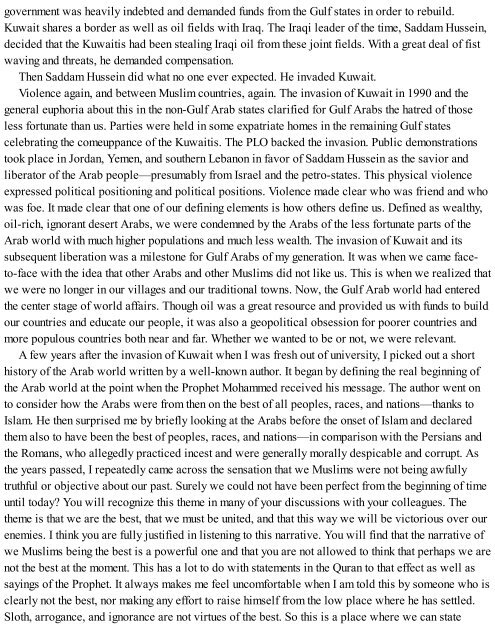1250119847
Create successful ePaper yourself
Turn your PDF publications into a flip-book with our unique Google optimized e-Paper software.
government was heavily indebted and demanded funds from the Gulf states in order to rebuild.<br />
Kuwait shares a border as well as oil fields with Iraq. The Iraqi leader of the time, Saddam Hussein,<br />
decided that the Kuwaitis had been stealing Iraqi oil from these joint fields. With a great deal of fist<br />
waving and threats, he demanded compensation.<br />
Then Saddam Hussein did what no one ever expected. He invaded Kuwait.<br />
Violence again, and between Muslim countries, again. The invasion of Kuwait in 1990 and the<br />
general euphoria about this in the non-Gulf Arab states clarified for Gulf Arabs the hatred of those<br />
less fortunate than us. Parties were held in some expatriate homes in the remaining Gulf states<br />
celebrating the comeuppance of the Kuwaitis. The PLO backed the invasion. Public demonstrations<br />
took place in Jordan, Yemen, and southern Lebanon in favor of Saddam Hussein as the savior and<br />
liberator of the Arab people—presumably from Israel and the petro-states. This physical violence<br />
expressed political positioning and political positions. Violence made clear who was friend and who<br />
was foe. It made clear that one of our defining elements is how others define us. Defined as wealthy,<br />
oil-rich, ignorant desert Arabs, we were condemned by the Arabs of the less fortunate parts of the<br />
Arab world with much higher populations and much less wealth. The invasion of Kuwait and its<br />
subsequent liberation was a milestone for Gulf Arabs of my generation. It was when we came faceto-face<br />
with the idea that other Arabs and other Muslims did not like us. This is when we realized that<br />
we were no longer in our villages and our traditional towns. Now, the Gulf Arab world had entered<br />
the center stage of world affairs. Though oil was a great resource and provided us with funds to build<br />
our countries and educate our people, it was also a geopolitical obsession for poorer countries and<br />
more populous countries both near and far. Whether we wanted to be or not, we were relevant.<br />
A few years after the invasion of Kuwait when I was fresh out of university, I picked out a short<br />
history of the Arab world written by a well-known author. It began by defining the real beginning of<br />
the Arab world at the point when the Prophet Mohammed received his message. The author went on<br />
to consider how the Arabs were from then on the best of all peoples, races, and nations—thanks to<br />
Islam. He then surprised me by briefly looking at the Arabs before the onset of Islam and declared<br />
them also to have been the best of peoples, races, and nations—in comparison with the Persians and<br />
the Romans, who allegedly practiced incest and were generally morally despicable and corrupt. As<br />
the years passed, I repeatedly came across the sensation that we Muslims were not being awfully<br />
truthful or objective about our past. Surely we could not have been perfect from the beginning of time<br />
until today? You will recognize this theme in many of your discussions with your colleagues. The<br />
theme is that we are the best, that we must be united, and that this way we will be victorious over our<br />
enemies. I think you are fully justified in listening to this narrative. You will find that the narrative of<br />
we Muslims being the best is a powerful one and that you are not allowed to think that perhaps we are<br />
not the best at the moment. This has a lot to do with statements in the Quran to that effect as well as<br />
sayings of the Prophet. It always makes me feel uncomfortable when I am told this by someone who is<br />
clearly not the best, nor making any effort to raise himself from the low place where he has settled.<br />
Sloth, arrogance, and ignorance are not virtues of the best. So this is a place where we can state
















